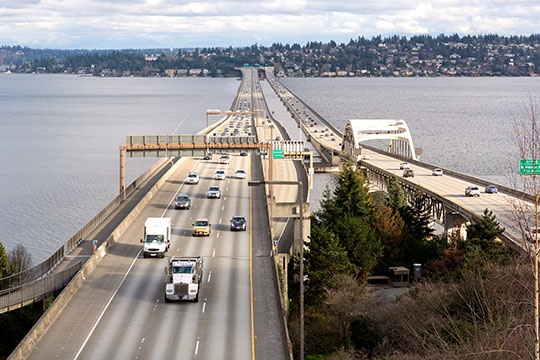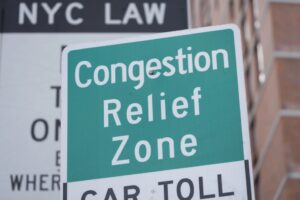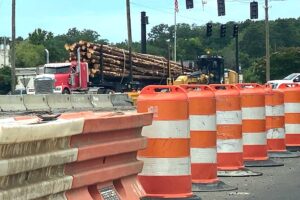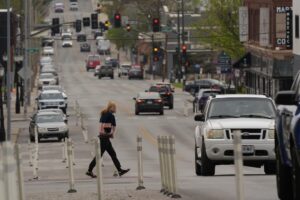SEATTLE — Washington state legislators are considering whether to remove “congestion relief” and “improved freight mobility” from their transportation goals, a departure from the American passion to expand highways.
House Bill 2688 would adopt seven goals – accessibility, safety, environment and climate, health and resilience, equity and environmental justice, preservation, and functionality. The Washington State Department of Transportation (WSDOT) supports the proposal.
“Instead of continuing to build our roads where individual members come up with projects because there’s a congestion in their district, what we need to be doing, is we need to be looking at this more holistically,” sponsor Rep. Sharon Shewmake, D-Bellingham, testified in committee. “Accessibility is really what we want to get at.”
Her bill defines accessibility as “affordable access to the places and goods Washington residents, organizations and businesses need to live, work, study, play and pray,” by all modes of transportation. A Senate version of the bill was introduced by Rebecca Saldaña, D-Seattle.
Driver advocates say ditching “congestion relief” and “improved freight mobility,” which now appear under a “mobility” goal, might hamper road building.
“We can’t afford to minimize the importance of freight mobility for our roadways,” Washington Trucking Association Executive Vice President Sheri Call told a state Senate committee recently. “Washington must continue to deliver projects that provide quality of life benefits for all users of the highways in Washington, and keep our economy moving forward.”
WSDOT Secretary Roger Millar hopes to bring more attention to worn-out roads and bridges. Currently, just 8 cents of the 49.4-center-per-gallon state gasoline tax goes toward maintenance and preservation, he said.
The state borrows so heavily for big projects such as the Highway 99 tunnel, the Highway 520 floating bridge and the widening of I-90 at Snoqualmie Pass East, that bond debt is forecast to consume three-quarters of gasoline taxes by 2028.
The declining condition of state highways is “a glide path to failure,” Millar told lawmakers in mid-January.
“That is going to result in some kind of intervention by the federal government,” Millar continued. “We have 4,000 lane miles of pavement that are due for preservation this year; we have another 3,600 miles that are past due and 1,600 miles in the system that are rated as ‘poor.’ Our budget currently provides for repaving 750 lane miles a year.”
Only four of 100 steel bridges are being repainted on time, he said.
A few other states are questioning whether they should keep adding freeways.
Texas Gov. Greg Abbott declared in January that his state is probably experiencing the “last major build-out of roads we’ll have in the state of Texas, even considering the fact that Texas is the fastest-growing state in America,” D Magazine reported.
The Pennsylvania Department of Transportation adopted what it called a holistic view in 2017, adding safety and environmental criteria.
Millar told a highway-officials’ convention in Spokane in 2018, “simply put, we cannot build our way out of congestion.”
He’s talking about the phenomenon known as induced demand. Freeway lanes eventually clog because people drive more or developers add housing and retail areas near interchanges. Lanes typically fill within two years, restoring a kind of traffic-delay equilibrium, said Todd Litman, founder of the Victoria Transportation Policy Institute in British Columbia.
As of yet, no state has frozen or canceled highway construction for the sake of reducing car dependency or greenhouse gases, according to Patrick McKenna, Missouri Department of Transportation director and president of the American Association of State Highway and Transportation Officials.
Environmental aims do limit highways in some communities, McKenna said, but money is a greater constraint. Missouri voters, for instance, have rejected measures to boost their 17-cent gas tax.
“At the practical level, the ability to fund these things is constricted,” he said. “We’ve had multiple decades of a public unwillingness to maintain the system in its current state, never mind expansions.”
Americans drove 3.3 trillion miles in 2018. Gasoline consumption rose for the seventh straight year, to 147 billion gallons, according to data from the Federal Highway Administration.
Seattle-area traffic remains the fifth worst in the nation, causing an average yearly delay of 138 hours per commuter, according to new rankings by the TomTom navigation company.
The Associated Press is an independent global news organization dedicated to factual reporting. Founded in 1846, AP today remains the most trusted source of fast, accurate, unbiased news in all formats and the essential provider of the technology and services vital to the news business. The Trucker Media Group is subscriber of The Associated Press has been granted the license to use this content on TheTrucker.com and The Trucker newspaper in accordance with its Content License Agreement with The Associated Press.






